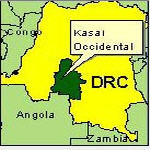 At least 160 people have died in an outbreak of the highly lethal haemorrhagic Ebola virus in the centre of the Democratic Republic of the Congo (DRC), the United Nations World Health Organization (WHO) reported today, announcing that it is rushing medical and supplies to the region to try to contain the disease.
At least 160 people have died in an outbreak of the highly lethal haemorrhagic Ebola virus in the centre of the Democratic Republic of the Congo (DRC), the United Nations World Health Organization (WHO) reported today, announcing that it is rushing medical and supplies to the region to try to contain the disease.
Laboratory analysis conducted in Gabon and the United States on samples taken from cases in the outbreak have confirmed the presence of the Ebola virus, which causes death in 50 to 90 per cent of cases.
WHO said some of the samples also show the presence of Shigella dysentery, which is complicating the treatment of victims, who are concentrated in the Mweka and Lwebo areas of DRC's Kasai Occidental province. It is not clear yet how many deaths were caused by Ebola given the apparent simultaneous outbreak of the diseases.
So far there have been 372 confirmed cases and 166 deaths, according to WHO, while Radio Okapi - which is part-operated by the UN peacekeeping mission in the DRC (MONUC) - reported today that there have been 168 deaths.
DRC health ministry officials are leading the response to the outbreak, but WHO said it was providing staff, supplies and equipment to the areas affected and it was also mobilizing a team of national and international experts to implement strategies to try to limit the size of the outbreak.
The Ebola virus is transmitted by direct contact with the blood, secretions, organs or other bodily fluids of infected persons or animals such as chimpanzees, gorillas, monkeys and antelopes, and it has an incubation period of two to 21 days.
Health-care workers have frequently been infected while treating sufferers because of the lack of adequate infection control precautions in affected countries in Central Africa. Burial ceremonies also can play a role in transmitting the virus when mourners have direct contact with the body of the deceased person.
Sufferers can experience fever, intense weakness, muscle pain, headaches and sore throats, as well as vomiting, diarrhoea, rashes and impaired kidney and liver function. In the most severe cases, the virus can lead to both external and internal bleeding.
WHO said there is no indication yet of any need to impose trade or travel restrictions with the DRC as a result of the outbreak.
Related articles
- • 'Deadly environment' plus 'political and social' obstacles hinder Ebola fight, Security Council hears (July 24, 2019)
- • Ebola outbreak declared an international Public Health Emergency (July 17, 2019)
- • DR Congo: The country that knows how to beat Ebola (December 11, 2014)
- • Ebola Epidemic Resurfaces in DR Congo's Equateur Province (August 25, 2014)
- • At least 60 killed as train derails in Katanga province (April 23, 2014)
- • Thousands of Women March Against M23 Rebels in Kinshasa (November 24, 2012)
- • Tshisekedi Says He Won, Can He Prove It? (December 17, 2011)
- • Kamerhe Rejects Single Opposition Candidate Strategy (November 19, 2011)
- • Tshisekedi's Mental Health Called into Question after Incoherent Statements (November 8, 2011)
- • Congo, India to Build Hydro Plant (July 12, 2011)
- • Security Council extends mandate of UN mission in DR Congo (June 28, 2011)
- • UN high-level HIV-AIDS meeting continues with progress reports (June 9, 2011)
- • Rights Groups: Strengthen Civilian Protection Before Elections (June 9, 2011)
- • Rape study 'questionable' (May 18, 2011)
- • UN Sanctions FDLR Leaders, CNDP Rebel Commander Integrated into Army (December 2, 2010)
- • UN launches patrols to head off rebel violence during holiday season (December 1, 2010)
- • 2010 Human Development Report analyses long-term development trends (November 4, 2010)
- • Congo Defense Minister Rejects UN Allegations against Army (October 17, 2010)
- • DR Congo improves education, child survival but greater efforts needed - UN (October 6, 2010)
- • Rebel leader presumed responsible for mass rape arrested (October 5, 2010)
- • UN DR Congo Report Exposes Grave Crimes (October 1, 2010)
- • UN says peacekeepers 'failed' DR Congo rape victims (September 7, 2010)
- • UN Defends Inaction on Mass Rapes in Eastern Congo, Government Missing in Action (August 26, 2010)
- • Two Suspects Arrested in Attack on MONUSCO Base (August 20, 2010)
- • Ban Ki-moon deplores deadly attack against blue helmets in North Kivu (August 18, 2010)
- • Officials Revise Death Toll from Boat Accident (July 30, 2010)
- • 138 Dead after Boat Sinks on Kasai River (July 29, 2010)
- • President Kabila Pays Respects to Sange Victims (July 5, 2010)
- • Ban Ki-moon inaugurates new phase of UN mission in DR Congo (July 1, 2010)
- • Congo Celebrates 50th Anniversary of Independence (June 30, 2010)
Tags: |







